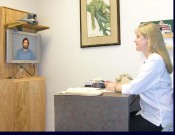Medical Interpreters Break Language Barriers in Health Care
MU partners with state organizations to provide interpreters for non-English speaking patients
September 16th, 2009

Karen Edison, director of the Center for Health Policy, talks with a patient via videoconferencing technology from the Missouri Telehealth Network. The technology is part of a grant-funded project that provides medical interpreters for patients.
COLUMBIA, Mo. – Language barriers in health care settings can decrease access to quality care and diminish comprehension for limited English proficient patients (LEP). These barriers compromise quality of care, and increase costs and inefficiencies. Now, the University of Missouri Institute of Public Policy, Center for Health Policy and Missouri Telehealth Network are partnering with the Language Access Metro Project (LAMP) and the Missouri Primary Care Association to provide medical interpreters to non-English-speaking patients who otherwise might not have access to live interpreters.
“The program will demonstrate the advantages of utilizing professionally trained medical interpreters for LEP patients, including improving patient communication by eliminating language and cultural barriers,” said Dana Hughes, policy analyst in the Truman School of Public Affairs. “Interpreters also help health care providers decrease costs and eliminate misdiagnoses and unnecessary testing.”
The Missouri Telehealth Interpretation Project will provide LAMP interpreters, free of charge for two years, to health care providers through the Missouri Telehealth Network (MTN), already in place throughout the state. MTN uses two-way live, interactive video to deliver patient care from providers in urban areas to underserved patients throughout the state in specialties such as dermatology, psychiatry, autism, endocrinology and others. LAMP interpreters will attend patient appointments and confirm appointments to reduce patient no-shows and late cancellations.
“By having access to interpreters, health care providers will be able to give linguistically and culturally competent care to their LEP patients,” said Nikki Lopresti, director of LAMP. “As word spreads, more LEP patients will gain access to improved quality health care.”
Resources for professionally trained medical interpreters in Missouri are limited, especially in rural areas. Availability, scheduling, and quality of interpreters are issues for many primary care clinics.
The project is funded by a grant from the Missouri Foundation for Health. After the initial two-year, grant-funded period ends, continued use of medically trained interpreters will benefit LEP patients, sustain the telehealth network and increase utilization of LAMP interpreters.
The MU Institute of Public Policy is a research and public service entity committed to increasing knowledge and understanding of issues facing Missouri state and local governments. It provides policy research to policymakers and conducts program evaluation and other applied research through contracts with public and non-profit entities.
The MU Center for Health Policy is dedicated to improving the health of all Missourians by bridging public policy and health care through objective research, policy analysis, and outreach.
The Missouri Telehealth Network exists to increase access to health care to underserved Missourians, to provide specialty care to Missourians in state facilities, to further homeland security efforts related to bioterrorism, disaster and pandemic preparedness and response. MTN allows patients to remain in their communities while receiving treatment from providers at distant locations. This enables those living in rural communities and underserved areas to access health care. Telehealth also saves time and money by reducing travel time, expenses and time that patients are off work.
LAMP has specialized in medical interpreting for more than 10 years. LAMP interpreters speak more than 25 languages and attend more than 1800 appointments per month. LAMP applicants complete reference and background screenings through the Missouri Department of Health and Senior Services–Family Care Safety Registry. Once hired, interpreters attend HIPAA privacy rules training and Protecting God’s Children, a national sexual abuse prevention program.
The Missouri Primary Care Association is a nonprofit corporation founded in 1984 as an alliance of community and migrant health centers. The association functions as an advocacy voice for the medically indigent, and implements activities aimed at providing health care services to urban and rural populations (regardless of ability to pay) in the state of Missouri. The association’s mission is to be Missouri’s leader in shaping policies and programs that improve access to high-quality, community-based, and affordable primary health services.

